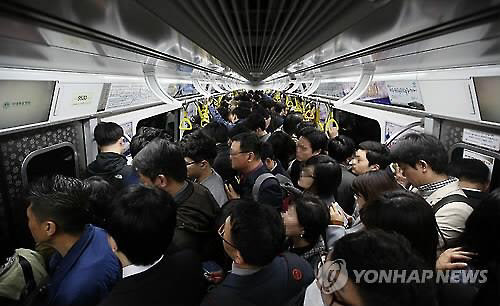South Korea's public utility rates rose at a much faster face than their overall consumer inflation in May due mainly to increased transportation fees, government data showed Monday.
The country's public utility rates rose 2.2 percent in May from a year earlier, far higher than the headline inflation rate of 0.8 percent, according to the data by the nation's statistical agency, central government ministries and provincial administrations.
After peaking at 2.1 percent in January 2010, the growth rate of public utility rates had been hovering below 2 percent before breaching the mark in October last year.
The growth rate of public service rates had remained below the overall consumer inflation rate since 2008, but it came to 1.2 percent in 2015, surpassing the 0.7 percent gain in overall consumer prices.
If the current trend continues, the growth rate of public utility charges is widely estimated to reach the 2 percent mark this year, the highest in seven years.
Last month's jump in public utility rates was attributed largely to increased bus and subway fares in the Seoul metropolitan area and other provincial cities. In May, the country's subway fares jumped 15.2 percent from a year earlier, with bus fares climbing 9.6 percent.
"The increase in overall transportation charges was driven probably by hiked bus and subway fares by Seoul, Incheon and other municipalities," a Statistics Korea official said.
Also responsible were hikes in water rates and sewage fees by several provincial government and municipalities, according to experts. Water bills gained 3.1 percent in May from a year earlier, and sewage charges spiked 20 percent.
In line with a central government recommendation to jack up water and sewage fees to 90 percent of their production costs by 2017, municipalities and local governments are set to mark them up down the road, heralding a further rise in overall utility rates, they added.
The surge in public utility rates comes as the country's overall consumer prices remain subdued. In May, the consumer price index fell below 1 percent after hovering above the level for the previous three months. (Yonhap)





![[From the Scene] Monks, Buddhists hail return of remains of Buddhas](http://res.heraldm.com/phpwas/restmb_idxmake.php?idx=645&simg=/content/image/2024/04/19/20240419050617_0.jpg&u=20240419175937)
